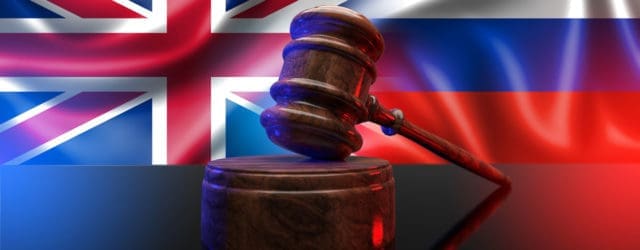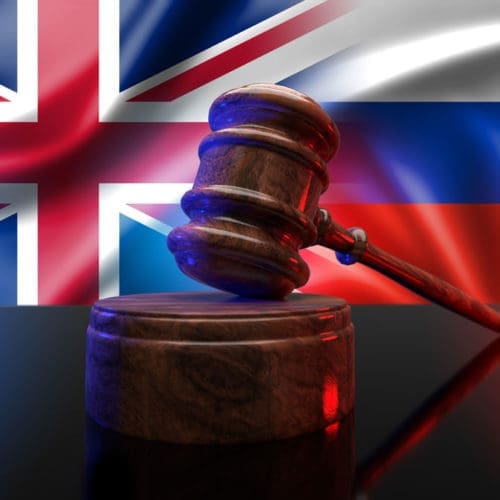UK sanctions on Russia: What do they mean for construction and engineering businesses?
February 2022Introduction
Vladimir Putin announced on 21 January 2022 the Kremlin’s recognition of the two breakaway territories in Eastern Ukraine, along with orders for Russian troops to occupy the two territories in a “peacekeeper” capacity. Many observers view these moves as a precursor to a wider invasion of Ukraine.
Western nations promptly announced plans moved swiftly to impose punitive sanctions against several Russian entities with important strategic connections to the regime.
We have received a high volume of questions from clients wishing to know what the sanctions mean for them and their projects, in particular those who have Russian clients or projects within the Russian Federation. Against this backdrop, we thought it would be useful to put together a briefing note outlining the key legal issues arising from the new sanctions together with practical guidance on steps they can take.
What are “sanctions”?
“Economic sanctions” cover measures designed to punish actors for violations of international law or accepted norms. These measures can include financial, trade, and travel-related restrictions strategically targeting individuals, entities, and countries (“Sanctioned Parties”).
The UK, the US and the EU all maintain rules implementing sanctions, as well as lists of individuals and entities who are covered. It is certainly possible for businesses to be impacted by more than one of these jurisdictions (for example, the US regime covers subsidiaries of US corporations as well as US incorporated entities).
Businesses who unwittingly deal with a sanctioned party risk violating the sanctions rules. That can lead to severe financial and criminal penalties both for the business and, in serious cases, company personnel as well.
UK sanctions in relation to Russia
The UK has a special regime for imposing sanctions on Russian individuals and entities (discussed below). These allow the UK Government to apply sanctions at short notice against identified targets. The UK sanctions rules are policed and enforced by the Office of Financial Sanctions Implementation, a unit within HM Treasury (“OFSI”).
The Russia (Sanctions) (EU Exit) Regulations 2019 (S.I. 2019/855) (the “Sanctions Regulations”) were made under the Sanctions and Anti-Money Laundering Act 2018 (the “Sanctions Act”) and provide for the freezing of funds and economic resources of certain persons, entities or bodies involved in destabilising Ukraine or undermining or threatening the territorial integrity, sovereignty or independence of Ukraine, or obtaining a benefit from or supporting the Government of Russia.
A licence can be applied for from OFSI to carry out actions for designated persons which would otherwise be prohibited.
On 22 February 2022 the Foreign, Commonwealth and Development Office used the Sanctions Regulations to update the UK Sanctions List. The following entries have been added to the consolidated list and are now subject to an asset freeze:
- Gennadiy Nikolayevich TIMCHENKO (Group ID: 14181)
- Boris Romanovich ROTENBERG (Group ID: 14182)
- Igor Arkadyevich ROTENBERG (Group ID: 14183)
- BANK ROSSIYA (Group ID: 14177)
- BLACK SEA BANK FOR DEVELOPMENT AND RECONSTRUCTION (Group ID: 14178)
- JOINT STOCK COMPANY GENBANK (Group ID: 14179)
- IS BANK (Group ID: 14180)
- PUBLIC JOINT STOCK COMPANY PROMSVYAZBANK (Group ID: 14184)
This adds to an existing list of sanctioned parties which had been maintained already by the UK (many of whom had a connection to the annexation of Crimea in 2014). The UK’s full list of sanctioned parties related to Russia is available here: https://assets.publishing.service.gov.uk/government/uploads/system/uploads/attachment_data/file/1056377/Russia.pdf.
Finance restrictions or “asset freezes” are in place against these entities. This is a prohibition on dealing with or making available funds or economic resources owned, held or controlled by a designated person. The US and EU regimes impose similar rules, although there is some divergence in terms of the list of sanctioned parties.
In respect of the latest sanctions, the UK Government has advised businesses that they must:
- check whether they maintain any accounts or hold any funds or economic resources for the persons listed (given the current tensions, it is a good idea to keep the full list under review now and in the future);
- freeze such accounts, and other funds or economic resources and any funds which are owned or controlled by persons set out in the Annex to the Notice;
- refrain from dealing with the funds or assets or making them available (directly or indirectly) to such persons unless licensed by OFSI;
- report any findings to OFSI, together with any additional information that would facilitate compliance with the Regulations;
- provide any information concerning the frozen assets of designated persons that OFSI may request. Information reported to OFSI may be passed on to other regulatory authorities or law enforcement.
The sectors with the greatest exposure are clearly banking, legal and financial services, all of whom operate accounts for their clients and are therefore in the business of dealing with funds or economic resources for clients.
Other sectors can be at risk too. In 2021 OFSI fined telecom operator Telia £300,000 (later lowered to £146,000) for allowing parties with connections to the Syrian Government to place long-distance phone calls. Those calls were placed to deal with assets owned by sanctioned parties, who had links to the regime of Bashir Al Assad.
What steps should you take?
Businesses must firstly recognise that falling foul of the law could have catastrophic consequences. OFSI has backed up the tough rules with enforcement action. That could lead to substantial fines, prosecutions and ultimately severe damage to reputation.
We would recommend the following:
- Make sure you have appropriate systems and policies in place to ensure compliance with international sanctions regimes.
- It is essential to “know your client” or business partner. In the case of corporate entities, this will not only involve a check on whether the named entity is on the sanctions list but will also entail working out the ultimate beneficial owner. If, for example, a company is 51% owned by a sanctioned person, the company as well as the subsidiary will be covered by the sanctions regime https://ofsi.blog.gov.uk/2019/12/17/am-i-dealing-with-a-sanctioned-entity/.
- Because of the dynamism of that list, ensure that the business’ actual and prospective trading partners are kept under review. Consider investing in sanctions software for that purpose and designating a compliance officer within the organisation.
- Be aware that construction or engineering companies are unlikely to be operating accounts or dealing with economic resources of sanctioned entities themselves. As the Telia case indicates, however, other sectors may still face risk.
- Take into account that when working with a sanctioned entity lawfully, there is also a real risk of funds being held up. Banks may be obliged to freeze assets held by the party in question. Escrow agents may also refuse to release funds which have fallen due.
- Consider the insurance position. Frequently, insurers will insert policy clauses that relieve them from having to pay out money to Sanctioned Parties, as that may put them in breach of the sanctions legislation. In Mamancochet Mining Limited (the Claimant) v Aegis Managing Agency Limited & Others [2018] the Court upheld such an exclusion clause although held that enforceability would come down to the construction of the wording of the clause, as applied to the situation at hand.
Exporting project equipment
It is also important to consider whether, as part of any project you are involved in, you will need to export equipment to Russia. If that equipment features on the dual use list, you will need an export licence before shipment takes place. Dual use technology is equipment which can have either a military or nonmilitary purpose. That can include for example computer hardware with encryption technology.
What may still happen?
Based on statements today and yesterday, the UK Government and its allies clearly expect the situation to get worse before it gets better. There is pressure on the Government to go further and expand the number of measures and targeted entities. The US and UK Government may act to stop Russian businesses from dealing in pounds or sterling. That would have adverse ramifications for project finance and the ability of consultants and contractors to be paid.
Please do not hesitate to contact us if you require any advice in relation to the rapidly developing sanctions framework.
Download PDF







